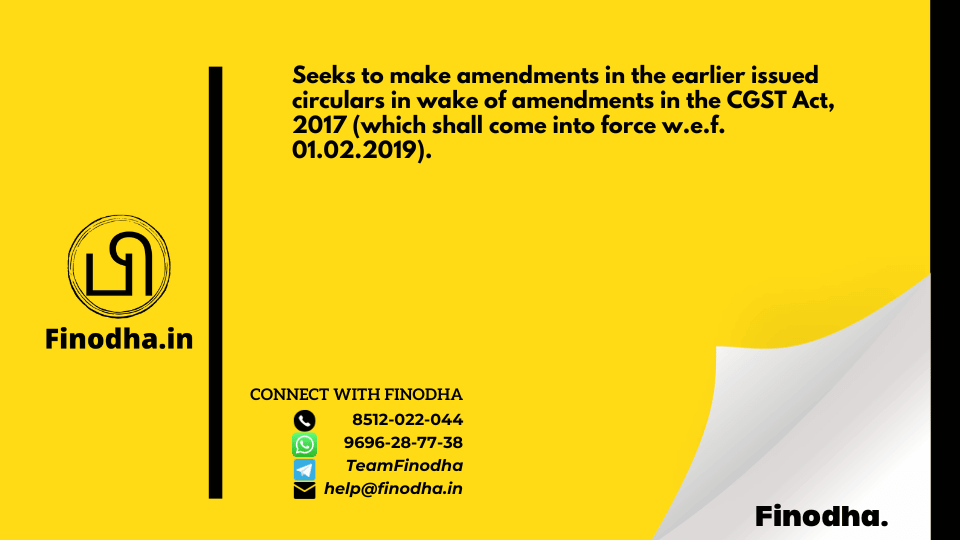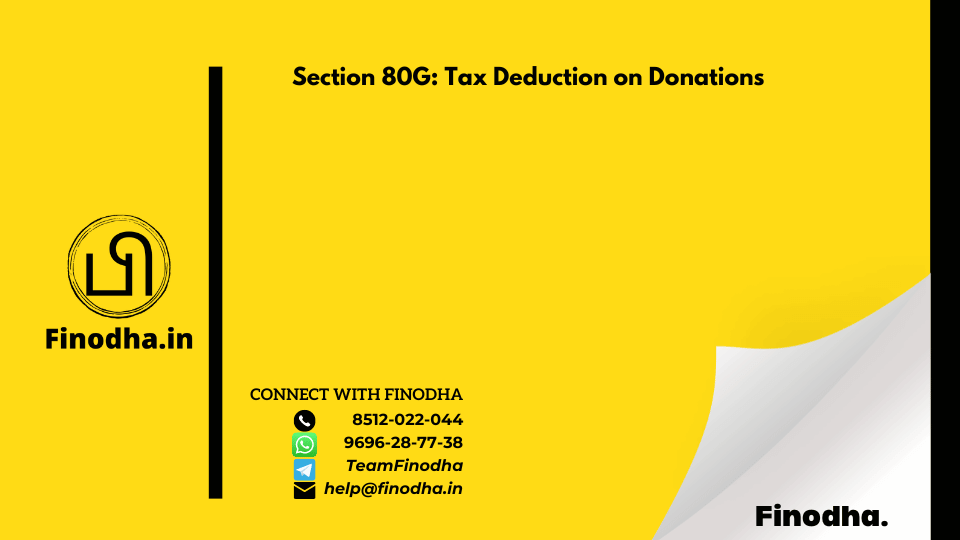Important Keyword: Chapter VI-A, HUF, ITR-1, Section 80G.
Table of Contents
Section 80G: Tax Deduction on Donations
Section 80G of the Income Tax Act provides an opportunity for taxpayers to claim deductions on donations made to specified charitable organizations and relief funds. This provision not only incentivizes donations but also allows taxpayers to contribute towards societal welfare while reducing their tax liability.
What is the Eligible Mode of Payment?
The method of payment plays a crucial role in determining eligibility for claiming deductions under Section 80G of the Income Tax Act. To qualify for these deductions, contributions must be made via cash, cheque, or demand draft.
Effective from the financial year 2017-18, donations made in cash exceeding INR 2,000 are not eligible for tax deductions. Previously, this limit stood at INR 10,000. Therefore, to avail of the deduction, contributions exceeding INR 2,000 should be made via cheque or demand draft.
It’s important to note that donations in the form of food, clothes, or medicines do not qualify for tax deductions under Section 80G of the Income Tax Act. To maximize your tax benefits while supporting charitable causes, ensure your contributions adhere to these guidelines regarding payment methods and eligible donations.
How to Claim Deduction:
When filing your income tax return, provide details such as:
- Name, PAN, and address of the charitable institution.
- Amount donated.
- Type of donation (whether to a specific fund or institution).
Limits and Eligible Institutions:
Not all donations qualify for full deduction. Here’s a breakdown:
- 100% Deduction: Donations to funds like the National Defense Fund, Prime Minister’s National Relief Fund, and various educational and cultural institutions.
- 50% Deduction: Donations to funds like the Jawaharlal Nehru Memorial Fund and Prime Minister’s Drought Relief Fund.
Donations with 100% Income Tax Deduction without any qualifying limit:
- National Defense Fund set up by the Central Government
- Prime Minister’s National Relief Fund
- National Foundation for Communal Harmony
- An approved university/educational institution of National Eminence
- Zila Saksharta Samiti constituted in any district under the chairmanship of the Collector of that district
- Fund set up by a State Government for medical relief to the poor
- National Illness Assistance Fund
- National Blood Transfusion Council or any State Blood Transfusion Council
- Fund for Technology Development and Application
- National Sports Fund
- National Cultural Fund
- The Army Central Welfare Fund or the Indian Naval Benevolent Fund or the Air Force Central Welfare Fund
- Andhra Pradesh Chief Minister’s Cyclone Relief Fund, 1996
- National Children’s Fund
- Chief Minister’s Relief Fund or Lieutenant Governor’s Relief Fund with respect to any State or Union Territory
- National Trust for Welfare of Persons with Autism, Cerebral Palsy, Mental Retardation, and Multiple Disabilities
- The Maharashtra Chief Minister’s Relief Fund during October 1, 1993, and October 6, 1993
- Chief Minister’s Earthquake Relief Fund, Maharashtra
- Any fund set up by the State Government of Gujarat exclusively for providing relief to the victims of the earthquake in Gujarat
- Any trust, institution, or fund to which Section 80G(5C) applies for providing relief to the victims of the earthquake in Gujarat (contribution made during January 26, 2001, and September 30, 2001)
- Prime Minister’s Armenia Earthquake Relief Fund
- Africa (Public Contributions — India) Fund
- Swachh Bharat Kosh (applicable from the financial year 2014-15)
- Clean Ganga Fund (applicable from the financial year 2014-15)
- National Fund for Control of Drug Abuse (applicable from the financial year 2015-16)
Donations with 50% Income Tax Deduction without any qualifying limit:
- Jawaharlal Nehru Memorial Fund
- Prime Minister’s Drought Relief Fund
- Indira Gandhi Memorial Trust
- The Rajiv Gandhi Foundation
Donations with 100% Income Tax Deduction subject to qualifying limit of 10% of adjusted gross total income:
- Government or any approved local authority, institution, or association for promoting family planning.
- Donation by a Company to the Indian Olympic Association or any other notified association or institution in India for sports infrastructure development or sponsorship.
Donations with 50% Income Tax Deduction subject to qualifying limit of 10% of adjusted gross total income:
- Donation to any public charitable trust.
- Authority constituted in India for housing accommodation needs or urban planning and development.
- Corporation referred in Section 10(26BB) for promoting minority community interests.
- Repairs or renovation of notified temples, Mosques, Gurudwaras, Churches, or other places of worship.
- Any other fund or institution meeting conditions under Section 80G(5).
What is Adjusted Gross Total Income for 80G?
It begins with computing your total income from all sources and then making adjustments as specified by tax regulations.
To determine your Adjusted Gross Total Income, start with your gross total income, which encompasses earnings from employment, business, property, and other sources. Next, deduct allowable expenses such as interest payments on loans, certain taxes paid, and investments in specified savings schemes. These deductions help lower your taxable income, thereby reducing the amount of tax you owe.
In the context of donations made to charitable organizations or trusts, Section 80G of the Income Tax Act provides incentives for philanthropy. When you contribute to eligible entities, you can claim deductions on the donated amount from your total income. This reduces your taxable income, resulting in lower tax liability.
| Gross Total Income | xxx |
| Less: Chapter VI-A Deductions except 80G | (xxx) |
| Less: Exempt Income | (xxx) |
| Less: Income chargeable to tax at special rate | (xxx) |
| Less: Income referred to in Sections 115A, 115AB, 115AC, and 115AD relating to non-residents and foreign companies. | (xxx) |
| Adjusted Total Income | xxx |
Let us take an example to understand the calculation better:
Raj contributed INR 25,000 to a government-approved institution for promoting family planning. (100% tax deduction allowed to a qualifying limit of 10% ATI)
Further, he contributed INR 40,000 towards the renovation of a temple (50% tax deduction allowed to a qualifying limit of 10% ATI)
He calculated his adjusted total income as INR 4,50,000.
| Particulars | Amount (INR) |
| Donation with 100% tax deduction qualifying limit | 25,000 |
| Donation with 50% tax deduction qualifying limit | 40,000 |
| Total Donation | 65,000 |
| 10% of ATI | 45,000 (25,000*100% + 20,000*50%) |
ITR Form Applicable for Section 80G
When filing your Income Tax Return (ITR) and claiming deductions under Section 80G, it’s essential to choose the appropriate ITR form based on your income sources. The available options include ITR 1, ITR 2, ITR 3, and ITR 4, each catering to different types of taxpayers. Here’s a breakdown to help you understand which form applies to you:
- ITR 1 (Sahaj): This form is suitable for individuals with income from salaries, one house property, other sources (like interest income), and having total income up to Rs. 50 lakh. If you have made donations under Section 80G and your income sources fall within the scope of ITR 1, you can claim deductions accordingly.
- ITR 2: If you have income from more than one house property, income from capital gains, or foreign assets/income, ITR 2 is applicable. You can still claim deductions under Section 80G while using this form, provided it matches your income profile.
- ITR 3: This form is for individuals and HUFs (Hindu Undivided Families) having income from business or profession. If you fall under this category and have made donations eligible under Section 80G, use ITR 3 to file your return.
- ITR 4 (Sugam): For individuals, HUFs, and firms (other than LLPs) opting for presumptive taxation under Sections 44AD, 44ADA, or 44AE, ITR 4 is appropriate. You can claim Section 80G deductions if your income is computed under these presumptive schemes.
Supporting Documents for Claiming Section 80G Deductions
Apart from the basic documents like PAN card and Form 16, you will need specific documents related to your donations:
- Stamped Receipt: Obtain a receipt from the organization to which you made the donation. This receipt should bear the stamp of the organization, details of your donation including amount, date, and PAN of the organization.
- Form 58: If you have donated to funds that qualify for 100% exemption under Section 80G, ensure you obtain Form 58 from the organization. This form is necessary to claim such deductions.
Read More: Section 80GG: Deduction for Rent Paid
Web Stories: Section 80GG: Deduction for Rent Paid
Official Income Tax Return filing website: https://incometaxindia.gov.in/
-

FREQUENTLY ASKED QUESTIONS (FAQs) ON FINAL GOODS AND SERVICES TAX (GST) Part- 11
-

Circular No. 04/01/2019 – IGST: Seeks to make amendments in the earlier issued circulars in wake of amendments in the CGST Act, 2017 (which shall come into force w.e.f. 01.02.2019).
-

Revolutionizing Transactions: The Dynamics of Cheque Truncations in India

